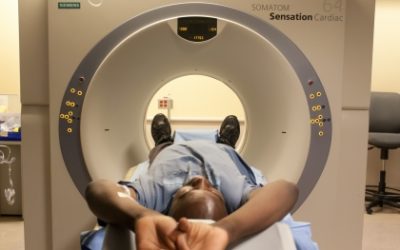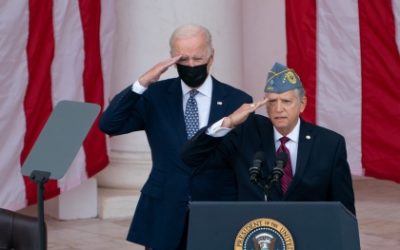Can niacin supplementation improve motor symptoms in Parkinson’s disease patients?
Altered Cholinergic Innervation in New Parkinson’s Patients
While evidence is strong that altered cholinergic innervation plays a key role in cognitive impairment in Parkinson’s disease (PD), at least in advanced stages, less is known about the relationship between cognitive impairment and cholinergic innervation early in the disease.
Adverse Events Predict Cognitive Decline After Brain Stimulation
In a small subset of Parkinson’s disease patients, deep brain stimulation is linked to statistically and clinically significant cognitive declines.
Veterans Suffered Myriad Mental Health Outcomes After COVID-19 Infection
More than two years into the pandemic, studies are showing the long-term effects COVID-19 can have on the heart, lungs, kidneys and other organ systems.
Burn Pit Exposure Legislation Likely to Get Senate Vote Soon
The Honoring Our PACT Act–the comprehensive toxic exposure legislation that passed with broad bipartisan support in the House–is looking increasingly like it will get a vote in the Senate.
Chronic Inflammation in mTBI Affects Sleep Quality
Occurring immediately after mild traumatic brain injury (mTBI), elevations of inflammatory cytokine levels can persist for years and are associated with neuropsychological outcomes, including depression and PTSD symptoms.
Daily Physical Activity Helps Less Serious Insomnia
An often recommended lifestyle intervention for insomnia is physical activity (PA). It is not clear, however, that more activity benefits patients across the range of insomnia severity.
Anger Contributes to PTSD Sleep Disorders
Anger is a major contributor to sleep problems among military servicemembers with post-traumatic stress disorder.
Most, but Not All, Hospital Acquired Infections Rose at VA During Pandemic
The COVID-19 pandemic’s effect on hospital acquired infections in various types of VA acute care was a mixed bag, although, overall, many rates increased, according to a new study.
Hospitalized Male Veterans With COVID-19 Didn’t Improve With Androgen Suppression
A potential protective role for suppression of the androgen receptor (AR) against COVID-19 incidence and severity has been observed in some retrospective analyses.
Milwaukee Nurse Identified Syringe Problem That Led to Recall
In August 2021, the medical device manufacturer Cardinal Health recalled approximately 267 million of their prefilled saline syringes. The syringes had been found to reintroduce air into the syringe after it had been expelled, which could have resulted in the injection of air into blood vessels, leading to serious injury or death.
COVID-19 Outbreak During Army Training Exercise Offers Prevention Lessons
Extreme weather during a field training exercise forced more than 100 Joint Base Lewis-McChord soldiers to shelter closely together last year and led to an extensive outbreak of COVID-19.
Older Black, Hispanic Veterans Much More Likely to Get Dementia Diagnosis
The incidence of dementia varies significantly by race and ethnicity among older adults receiving care at VHA medical centers, according to a new study. Why that occurs was not immediately clear, however.
Study Finds Alarmingly High Suicide Rates Among AI/AN VHA Patients
American Indian and Alaska Natives (AI/ANs) in the general population have the highest rates of suicide of all race groups in the United States, as well as the most rapidly growing suicide rates, according to a new study.
Repeat Lung-Cancer Screening Continues to Fall Behind for Rural Veterans
Repeat lung cancer screening lags among rural veterans and could help explain known disparities in outcomes, according to a new study.
Public Health Service Bill Seeks to Put Pandemic Lessons to Use
The Senate Health, Education, Labor and Pensions (HELP) Committee recently marked up the PREVENT Pandemics Act—a bipartisan piece of legislation combining ideas from over 37 different bills and dozens of legislators.
Mortality Is Higher Than Expected in Post-9/11 Veterans With TBI
In the 20th century, military servicemembers were found to be healthier than the average individual, with lower mortality rates than their U.S. civilian counterparts.
VA Studies Find Older Patients Unexpectedly Amenable to Deprescribing
Clinicians are often wary of suggesting that older patients discontinue some of their medications, believing they will get pushback.
New Line of USP <800> Labels Can Help Assure Staff, Patient Safety
Pharmacists and other healthcare professionals understand the importance of clearly identifying medications requiring special handling, such as those covered by USP <800> and that the safety of staff and patients is at stake.
AMA-Negative Cholangitis Patients Have Similar Outcomes
Patients diagnosed with antimitochondrial antibody (AMA)-negative primary biliary cholangitis (PBC) have clinical and histopathological findings consistent with PBC but without positive AMA.
Deployment Increases Alcohol Misuse Risk Among National Guard, Reservists
Active-duty servicemembers face well known and quantified risk for alcohol misuse. Consequently, many return from combat to military bases, where they receive screening and have ready access to behavioral health.
Why Diabetes Patients With NAFLD Have Higher HCC Risk
While it is recognized that patients with nonalcoholic fatty liver disease who also have Type 2 diabetes mellitus (DM) have a high risk of progression to hepatocellular carcinoma. Exactly what causes the higher risks remain unclear, however, according to a new study.
Biomarkers Signal Risks for HCC in Cirrhosis Patients
For a patient with cirrhosis, the five-year risk of developing hepatocellular carcinoma (HCC), a highly lethal cancer with a significant increasing incidence and mortality, might be as high as 30%.
Gout Associated With Slightly Decreased Risk of Glaucoma in Veterans
How does a history of gout or arthritis due to hyperuricemia affect the development of the ocular neurodegenerative condition glaucoma?
Are DoD’s Suicide Prevention Efforts Failing? Some Legislators Think So
When it comes to suicide prevention, is the DoD putting its time and money in the right place? That was the question asked at a recent House Armed Services Military Personnel Subcommittee hearing.
In-Hospital Weight Loss Signals Improved Clinical Outcomes in HF Patients
Nearly all patients hospitalized for acute heart failure are acutely congested due to fluid retention and have gained weight by the time of their admission.
VA’s Prescribing of Direct-Acting Oral Anticoagulants Often Guideline Discordant
Since they were first approved by the Food and Drug Administration in 2010, direct-acting oral anticoagulants (DOACs) have become the most commonly-prescribed anticoagulants for nonvalvular atrial fibrillation (NVAF) due to their predictable pharmacokinetics, few drug-drug interactions and low monitoring requirements.
Recovered COVID-19 Patients Have Much Greater Risk of Incident Diabetes
While it has been obvious for some time that the COVID-19 pandemic would create longer-term health effects, it is only now becoming clearer what some of those might be.
Military, Veterans More Likely to Be Screened for Many Types of Cancer
While some cancer diagnoses are disproportionately high among VA patients, the cause does not appear to be inadequate screening, according to a new study.
Biden Underscores Commitment to Veterans Who Had Toxic Exposures
During the State of the Union address, President Joe Biden shined a light, as he has many times in the past, on the effects of toxic exposure, declaring that he would continue to make it a priority of his administration.






